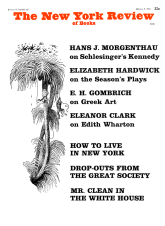In response to:
It's All in Your Mind from the November 25, 1965 issue
To the Editors:
Morton White, in his review of Freedom of the Individual, makes a sharp separation between causally explaining and morally justifying. Since we can causally explain the beliefs we morally defend, the free-will advocate allegedly loses the argument.
But the issue is not about propositions but about actions. While we cannot defend a belief and causally explain it at the same time, we can justify and explain an action at the same time. The point is clear in the Declaration of Independence. The rebels not only defend their action; the reasons they give are an important part of the explanation of their revolution. Historical scholarship has, in fact, as Page Smith points out, returned “after a century and a half of progress…in research techniques, in tools and methods,” to the interpretation “held, substantially, by the historians who themselves participated in the Revolution or lived through that era.” (The Historian and History, p. 193.)
Mr. White’s absolute separation between justifying and explaining is a legacy of that positivism which the linguistic philosophers have helped us to transcend. To leave the issues where Mr. White drops them is to fog the fact that in humanistic studies we need a much more complex and subtle model of explanation.
Cushing Strout
Ithaca, New York
Morton White replies:
I am not sure that I can show Mr. Sing-nan Fen what is wrong with his alleged counter-example, but I will try to. If a friend of his should announce: “I believe in this because (as reason and cause at the same moment) Singnan Fen told me so,” the announcement may be perfectly justified. Fen’s telling him so may well be the cause of and reason for his belief, at the same moment—whatever this last phrase may mean in this context. But it does not follow that Fen’s friend can simultaneously or in the same interval of time go through the different processes of (1) presenting the cause of his belief as cause and (2) presenting the reason for his belief as reason. The point is that Fen’s report to his friend may have two properties—that of being cause of and that of being reason for his friend’s belief—without his friend’s being able to regard the report in both of these ways simultaneously or during the same interval. When he takes it to be the cause and presents it as such he does something that fills his consciousness, if I may be allowed to use that old-fashioned expression; when he takes it to be the reason and presents it as such he does another, equally absorbing thing. The two activities are not related as tapping your head with one hand and running your other hand in circles around your stomach. Therefore I invite Mr. Fen to return to his interesting example and ask himself whether it does not take him more than one moment or one interval of time to think through his double-barrelled reply to what he regards as a double-barrelled question.
Unlike Mr. Fen, Mr. Cushing Strout holds that whereas a person cannot defend and causally explain a belief at the same moment or during the same interval, he can accomplish this in the case of an action. But Strout’s argument is just as unsuccessful as Fen’s for similar reasons. I agree that a historian may causally explain the actions of the rebels of 1776 by citing an abuse that the rebels cited when they gave their reasons for rebelling. But I insist first of all, as I do in the case of Fen’s alleged counter-example, that when the rebels defend their rebellion they do something different from what they do when they become historians of their own deeds and explain them causally. I also insist that the rebels do not engage in explanation and defense at the same moment or during the same interval even when they cite in one sentence, which is similar to Fen’s, the same abuse as both cause and reason. If the statement “We are rebelling because the King has imposed taxes on us without our consent” is as ambiguous as Fen thinks, the statement “I believe in this because Singnan Fen told me so” is, and if one acknowledges that ambiguity and asserts both halves of it by inserting Fen’s parenthetical phrase after the word “because,” one can see that my answer to Strout is strictly analogous to my answer to Fen.
I should add that our inability to explain and justify simultaneously or in the same interval is not just an inability to fuse what might be called two thoughts into one, for we can at the same moment or in the same interval think that one and the same thing is both red and round. The inability is, I believe, connected with the fact that the difference between being a cause and being a reason is a greater difference than that between being red and being round, but I cannot in the space allotted to me amplify or defend that statement.
This Issue
January 6, 1966



